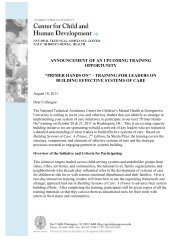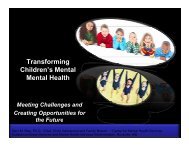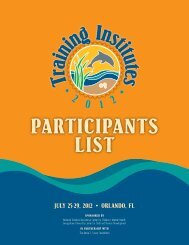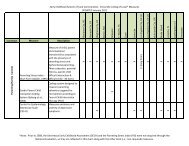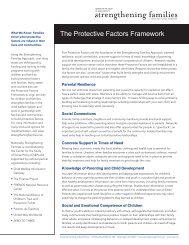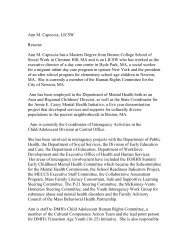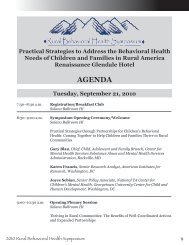Training Institutes 2012 - National Technical Assistance Center for ...
Training Institutes 2012 - National Technical Assistance Center for ...
Training Institutes 2012 - National Technical Assistance Center for ...
Create successful ePaper yourself
Turn your PDF publications into a flip-book with our unique Google optimized e-Paper software.
INSTITUTES<br />
Institute will include exercises <strong>for</strong> participants to explore their roles, barriers to being family driven, problem-solving<br />
to overcome barriers, and to develop a strategic plan that is unique to their individual role in their agency or system.<br />
Participants will also be provided with a tangible reminder to “stay on the road to family-driven care.” The faculty<br />
team <strong>for</strong> the session will offer the perspectives of a family organization administrator, system of care leader, and<br />
family members.<br />
MODERATOR/PRESENTER: Millie Sweeney, M.S., Assistant Director <strong>for</strong> Programs, Tennessee Voices <strong>for</strong> Children,<br />
Nashville, TN<br />
Monica Causey, L.A.P.S.W., Lead Family Contact, Early Connections Network, Tennessee Voices <strong>for</strong> Children, Nashville, TN<br />
Shani Cutler, Lead Family Contact, Tennessee Voices <strong>for</strong> Children, Knoxville, TN<br />
Kathy Rogers, M.S.W., Statewide Family Support Network Coordinator, Tennessee Voices <strong>for</strong> Children, Nashville, TN<br />
INSTITUTE #10 1:30 PM THURSDAY • 8:30 AM SATURDAY • SANIBEL 1-2-3<br />
Resiliency <strong>for</strong> ALL Youth and Families: Leveling the Playing Field<br />
OBJECTIVES—Participants will learn:<br />
1. To identify key supports and values that youth with significant emotional challenges and their families feel that they<br />
need to be resilient<br />
2. To integrate practical strategies that promote youth and family resiliency into their daily lives and/or practice<br />
3. To assist youth and families in identifying and developing assets and protective factors that enhance their resiliency<br />
4. To foster culturally mindful and resiliency-promoting partnerships with all youth and families<br />
5. To identify specific policy implications and recommendations to take back to their states, communities,<br />
tribes, or territories<br />
This Institute will focus on resiliency-oriented and culturally mindful approaches and practice strategies that promote<br />
mental wellness and resiliency in youth with mental health challenges and their families. Family will share their<br />
perspective that resiliency is an expectation <strong>for</strong> all youth and young adults, across all cultures and communities, and <strong>for</strong><br />
all health abilities and challenges. The Institute will highlight resiliency-oriented and culturally competent perspectives<br />
<strong>for</strong> partnering with youth and families; practical strategies identified by youth and families that nurture, support, and<br />
facilitate their resiliency; a practice framework <strong>for</strong> integrating resiliency concepts into a strength-based approach to<br />
mental wellness; and multimedia strategies <strong>for</strong> promoting and disseminating a resiliency initiative.<br />
The strategies to be articulated are based on the work of the Ohio Department of Mental Health that sponsored a<br />
task<strong>for</strong>ce of youth with serious emotional challenges and their families (Resiliency Leadership Ohio) to operationalize<br />
resiliency as an overarching framework <strong>for</strong> youth and family mental wellness, and as a foundational philosophy <strong>for</strong><br />
mental health practice. Resiliency was defined as “an inner capacity that, when nurtured, facilitated, and supported by<br />
others, empowers children, youth, and families to successfully meet life’s challenges with a sense of self-determination,<br />
mastery, and hope.” A resiliency consensus statement, summarizing the 12 constructs that youth and families identified<br />
as supporting their resiliency, <strong>for</strong>ms the basis <strong>for</strong> the development of the resiliency practice strategies and model of care<br />
to be offered in this session.<br />
Specific topics to be covered focus on operationalizing what “building resiliency” means in a system of care and fall in<br />
four main topic areas:<br />
• Youth and family-based insights on resiliency and supporting research<br />
• Resiliency and cultural competency<br />
• Building family resiliency: a parent’s guide<br />
• Translating resiliency into practice: practical strategies and tools<br />
Youth and family stories of resiliency will be utilized to illustrate all didactic material presented. In addition,<br />
participants will explore in groups how services and supports in their communities could be enhanced to best promote<br />
resiliency and to identify potential barriers and solutions to implementing their ideas in their communities. Multimedia<br />
42 <strong>Training</strong> <strong>Institutes</strong> <strong>2012</strong>



